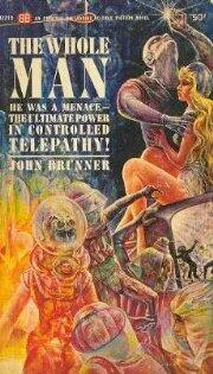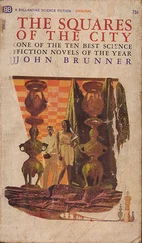The Whole Man
by John Brunner
Spiritus intus alit, totamque infusa per artus Mens agitat molem et magno se corpore miscet.
Vergil:
Aeneid, VI 726-7
After the birth they put her in a bed, a large woman wasted by worry and hunger, so that it was not only over her emptied belly that her skin hung old-clothes-fashion. In spite of her wide pelvic girdle she had had a difficult labor; the tired-faced doctor had judged her a few per cent worse off than those others who competed for space in the hospital ward, so she had been allotted the bed. She showed no sign of appreciation. She would have shown no sign of resentment, either, if she had been treated the same as most other women passed through the delivery room that day, and taken to an arm-chair to rest for a mere couple of hours while they scrubbed down the floor with a solution of caustic soda, for lack of disinfectant, burned the craft paper off the delivery table and put on fresh, for lack of laundry facilities.
The crisis had been gestating just about as long as the child. It had culminated a week or two ahead of him. There were two panes out from the window next to her bed, and the gaps had been covered with newspaper and adhesive tape. The woman in the bed on the right had a gunshot wound and lay with puzzled eyes staring at the ceiling. In one corner of that ceiling was the trace left by a licking tongue of greasy smoke, exactly the same shade of black edged with grey as would have been left by a candle, but two feet wide.
From the street noise came, unfamiliar, disturbing. Last month there would have been the drone of traffic, a buzz of people wandering in sunlight, a predictable, comforting background with commonplace associations. Now there was the occasional hoarse shout, grossly amplified, but blurred by the direction of the portable loudhailer so that it was impossible to tell more than that orders were being given. Also there was the growl-rumble-clank of a heavy tracked vehicle; the acid bite of police whistles; stamping of unison feet. Automatically the mind tensed, wondering whether there would follow the stammer of guns.
An hour or so after the birth a woman in olive-green battle-dress came to the door of the ward. Her hair was cut man-short and there was a belt with a shiny brown holster strapped around her waist. She looked about her curiously and went away.
Another hour, and an old man came pushing a squeaky trolley with two urns on it, one containing watery soup and one containing watery coffee. There was also bread. A nurse hurried in directly after and distributed bowls and mugs to those patients who could eat.
And a little later still another nurse came, her face drawn and her mouth down-turned, with the doctor who had supervised the delivery.
Every available bed was in use; only the fact that there weren’t more beds had ensured the floor-space was left between patient and patient. Awkwardly, sometimes having to sidle, the nurse and doctor came to the new mother.
“You — uh—” The doctor changed his mind about putting it that way, cleared his throat, tried again. “You haven’t seen your baby yet, Mrs—?”
“Miss,” said the woman in the bed. Her eyelids rolled down like blinds over her lack-luster eyes. Her hair tangled untidily on the pillow, dark and greasy. “Miss Sarah Howson.”
“I see.” The doctor wasn’t sure if he did or didn’t, but the remark filled a silence even though the silence was subjective, already occupied in reality by the clanging of empty tin bowls as they were collected up after the patients” meal.
The nurse whispered something to the doctor, showing him a roneotyped form: square grey lines on grey paper. He nodded.
“I’m sorry about the delay, Miss Howson,” he said. “But things are difficult at the moment… Have you chosen a name for him yet?” And, catching himself because he was never sure under present circumstances how far the normal routine had actually deteriorated: “You were told you have a boy, weren’t you?”
“I guess so. Yes, somebody did say.” The woman rolled her heavy head from side to side as though seeking an impossible position of comfort.
“If you’ve chosen a name, we can enter it on the record of the birth,” the doctor prompted.
“I—” She rubbed her forehead. “I guess… Say, are you the doctor who was there?” Her eyes opened again, searched his face. “Yes, you’re the one. Doc, it was bad, wasn’t it?”
“Yes, it was pretty bad,” the doctor agreed.
“Did it — ? I mean, is there permanent—?”
“Oh no, there’s no permanent damage!” the doctor cut in, hoping to sound reassuring in spite of his splitting headache and gut-souring exhaustion. He wasn’t sure of anything any more, it seemed — no one was, currently — but it was a habit to be reassuring.
Where had it all gone? How? The safe calm world of a few weeks back had split apart, and they said “crisis” without explaining anything. To most people it meant nothing of itself; it was just that a bus didn’t show at your regular stop, and the electricity failed in the middle of cooking dinner, and there was a slogan half-finished, smeared letters of red paint, on the sidewalk, and a monument to a dead hero had tilted crazily on its shattered plinth, and the prices of food had soared, and the radio groaned old records and said every fifteen minutes that people should be calm.
Also to the doctor it meant probing hideous wounds for bits of stone and splinters of glass; it meant shortages of disinfectants, antibiotics and even blankets; it meant concussion, shot-wounds and home-made incendiary bombs thrown through the windows.
Now there were the strange uniformed men speaking a dozen languages, on street-corners with their guns easily slung; there were officers who came asking questions about needed supplies and surplus bed space if any; there were food-ration stands at big intersections and measured handouts of basic nourishment, followed by the stamping of the left hand with a one-day indelible ink to prevent you calling back until tomorrow — all as though the population had been turned at a blow into a blend of criminals and charity patients.
“Oh, damn…” said the mother, head rolling anew. “I hoped never to go through that again. And I still could, huh?”
The nurse gave a sour glance at the doctor, who forced himself back to the present. The idea was to get the name fixed in the woman’s mind, to displace the simple idea “baby’, to offer some sort of handle to her when she was compelled to grasp the facts.
“Have you chosen a name for your son?” the doctor demanded loudly.
“Name? Well — Gerald, I guess. After his father.” Beginning to reveal puzzlement, the woman gazed directly at the doctor and frowned. “What’s this all about, anyway? Why didn’t you bring him to me long ago? Is something wrong?”
The hell with soft-pedaling. The hell with finesse. The doctor said shortly, “Yes, I’m sorry to tell you there is.”
“Such as what? No arms, no legs?”
“No, nothing so bad, fortunately. There’s a — a generalized deformity. It may well be possible to put it right, in time, of course; it’s too soon to say, though.”
The woman stared for a long moment. Then she gave a harsh chuckle.
“Well, God damn! Isn’t that just like the bastard? He wouldn’t marry me — said there wasn’t anything certain enough about the world to make plans for life… So then when I’d been through it I was telling myself at least I’d have a son for my old age — heh-heh — and here’s a cripple. I have to support him instead of…” The chuckling returned, and ran together into a dull shuddering moan.
Читать дальше












